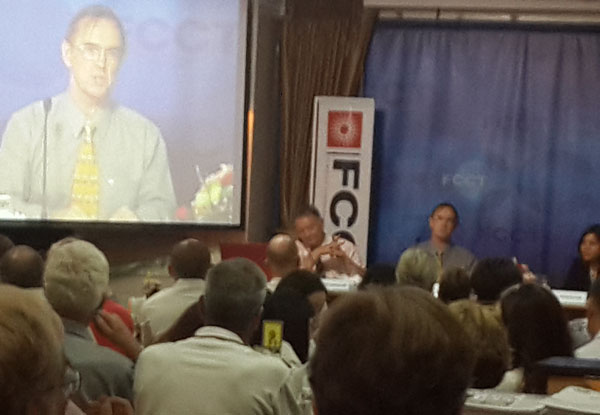Sued, harassed and assaulted, Wyn Ellis tells of his five years of legal hell which ensued after filing a simple plagiarism complaint against a Chulalongkorn University official.
When he came to talk about the people who’ve tried censoring him, Pattaya muckraker Andrew Drummond probably didn’t expect to be censored. But there he was Wednesday evening at the Foreign Correspondents Club of Thailand, which had decided to pull a screening of Drummond’s expose on shady foreigners after one of them threatened the organization with legal action should they proceed.
According to Drummond and two other panelists who described their experiences in a sort of legal purgatory, Thailand’s libel laws benefit the powerful at the expense of the public.
“Public officials in Thailand really don’t have thick skin,” said Supinya Klangnarong, a former journalist and media-rights activist who serves as a commisioner of the National Broadcast & Telecommunication Commission.
Ten years ago Supinya was charged with defamation by the company of former Prime Minister Thaksin Shinawatra for comments she made in the Thai Post newspaper. Three years and THB1.2 million later, she eventually won her case, but such victories are rare.
An average of 1,600 defamation cases are filed each year by officials, corporations and private individuals, according to David Streckfuss, an expert on the legal perils of expression in the Thai kingdom. Of 1,488 cases received last year by the office of the attorney general, 92 percent were prosecuted. Of those, conviction is all but guaranteed.
“The office of the attorney general must be one of the best in the world,” Streckfuss said to laughter. “Because … if it gets to the court, there is a 98.2 percent conviction rate. It’s very efficient.”
Academic Wyn Ellis, a former UN consultant now working for Chulalongkorn University, has been assaulted, threatened and still lives under a legal cloud five years after reporting a simple plagiarism complaint. Holding aloft a copy of his then-boss’s pHD thesis thesis, Ellis showed all but a handful pages had been copied, some from his own reports.
“The director of a national agency had republished [Ellis’ original report on asparagus] under his own name,” he said. “He used the same cover design template, sticking his name in front, deleting all refs to the UN.”
Motorcyclists have smashed the windows of his car with Ellis inside, and he has received hundreds of threats. Not to mention the legal limbo of a slow court process, in which the truth of your words is insufficient defense. Four years after Ellis first made his accusations against his former boss – also at Chulalongkorn – the university finally concluded the thesis was plagiarized and rescinded the man’s pHD.
Yet prosecutors continue push to continue their case against Ellis, he said, despite the proven truth of his original accusation.





Reader Interactions